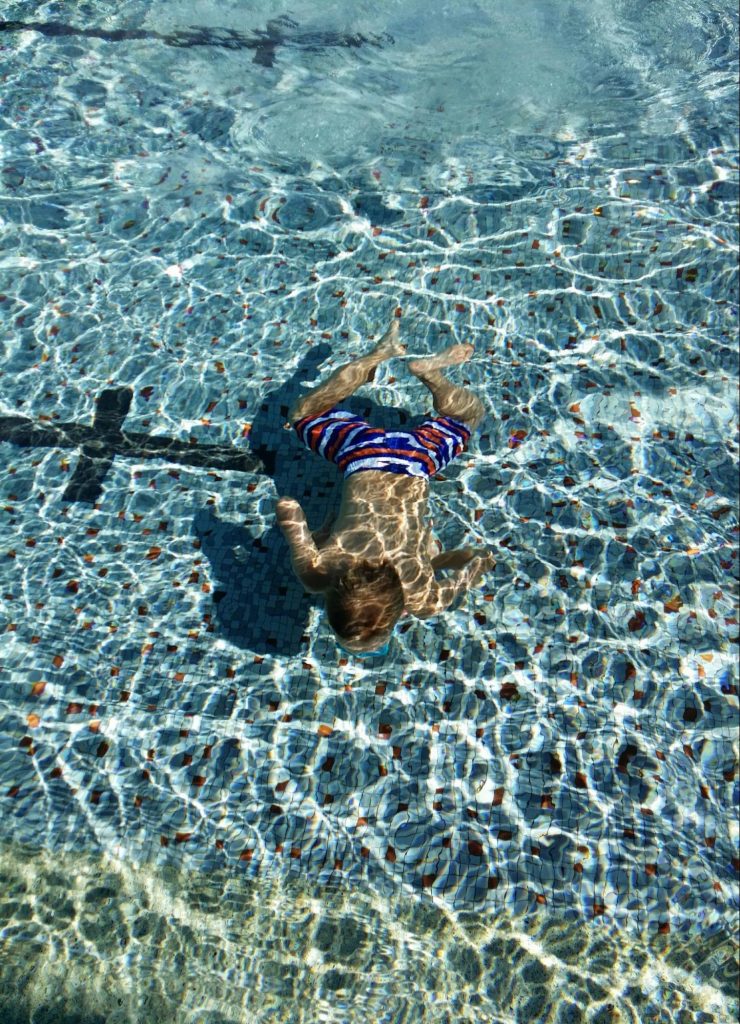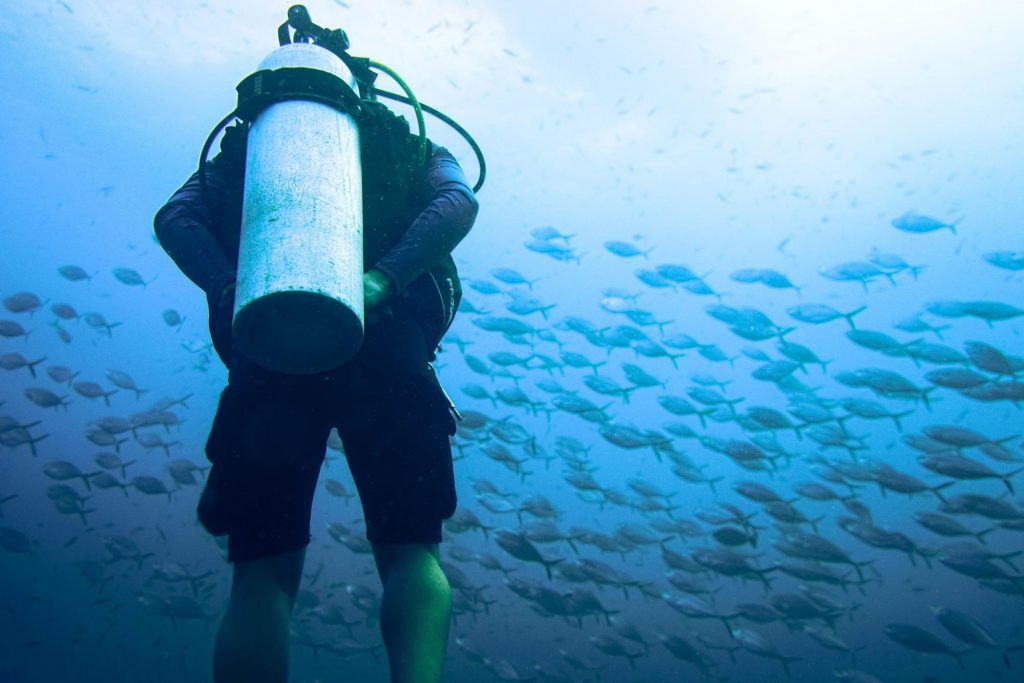Did you ever swim to the bottom of a pool and suddenly your ears were killing you? What you experienced was one of the most common problems associated with diving: Ear pain caused by a significant increase in water pressure. We’ll take a close look at why your ears hurt and what you can do about it.
*If you’re suffering from ear pain from diving, a ruptured eardrum or have any other concerns around your hearing health, contact us at 076 396 266, 064 402 2666 or Visit us at our Clinic and get a thorough diagnosis of your ears by one of our friendly, qualified doctor team.

Scuba divers are constantly exposed to this phenomenon. So much so, that the diving community named it the “ear squeeze”. As divers descend down towards the bottom of the sea, the water pressure on their eardrums increases. This pressure against the eardrums causes the symptoms of ear squeeze.
Starting with a feeling of fullness, it can become quickly very uncomfortable and dangerous as the eardrums swell and bulge. If the pressure continues to increase, the eardrums may burst. As a result, freezing cold seawater rushes into the middle ear, causing nausea, dizziness and vomiting. A less than ideal situation for a diver many meters below the surface of the water.
Since scuba divers usually go far below the normal depth of a public pool, there must be a solution to this kind of ear pain. Should you ever be diving and experiencing ear pain, it is very important not to ignore it.
You need to know how to clear your ears and when to abort the dive to prevent injuries and permanent damage to your ears. So let’s dive right in.
Why do your ears hurt when you’re diving?
As you dive deeper underwater, environmental pressure increases drastically. It’s why submarines have to be highly pressurised to prevent them from being crushed as they dive far below the surface. Your ears are similar in that way.
Normally, the pressure inside and outside of the ear is the same. Then, everything is fine and you’re probably not giving it another thought.
But when you dive, there is water on the outside of your ear, and air on the inside of your ear – the middle ear to be exact (the middle ear is the area behind the eardrum).
Your body can counterbalance this pressure, but for this to happen, the air pressure must reach the inner surface of the eardrum. And that is a job for the eustachian tube.
The eustachian tube links the ears to the nose and throat and opens and closes to regulate the middle ear pressure. If the eustachian tube is not functioning correctly, you’ll feel the “ear squeeze”.
Ear injuries from diving are completely preventable. In order to stay safe, you need to learn how to equalise the pressure in your ears BEFORE you start diving.
You might recognise this phenomenon from elsewhere. If you’ve ever been on an aeroplane, you’ve probably felt it in your ears before. When the plane takes off or lands, the air pressure around you changes. Oftentimes people recommend chewing gum during a flight and they’re not wrong. The movement of your jaw can possibly open up the eustachian tube, helping your ears to equalise the pressure.

What can make ear pain worse?
Anything that may affect the functionality of the eustachian tube will make ear pain more likely whilst scuba diving. Even the common cold can greatly affect the performance of the eustachian tube, along with other respiratory problems and chronic sinus conditions. Allergy suffers, including those with hay fever are at risk, too. So are smokers and other individuals with pre-existing conditions, such as nasal polyps or previous facial trauma.
Note: Prospective scuba divers who are suffering from a respiratory illness or significant nasal/sinus problems should be discouraged from diving by their instructor.
Ear pain from diving: Knowing the risks
One of the major risks associated with ear pain whilst scuba diving is the potential to perforate the eardrum. A very simple rule can be applied here if you are experiencing ear pain whilst descending underwater: Stop your descent and try to equalise. If you are unable to equalise, the dive must be aborted and you should return to the surface.
If you are unable to equalise and relieve the ear pain and continue your descent, you are at a very high risk of perforating your eardrum, which carries the added risks of disorientation, dizziness and nausea – not something you want whilst you are deep underwater.
Once an eardrum has been perforated it may never fully return to normal, so you may be left with recurrent problems preventing you from diving in the future.

Treatment forms for ear pain from scuba diving
Ear pain through scuba diving is usually temporary, and will likely disappear on its own, usually within a few days. If this pain persists, we do recommend that you seek medical intervention.
Should the eardrum be perforated, it normally heals naturally, without medical intervention. But it is important to keep the ear dry during the healing process or be at risk of middle ear infections.
If you choose to seek medical attention following the scuba dive, the physician will likely initially ask a series of questions regarding the dive itself, alongside medical history questions regarding previous sinus problems and respiratory illnesses.
They will then examine the ear thoroughly using an otoscope, in order to assess the health of the eardrum. They will look for any perforations, and look to see if the eardrum is ‘bulging’, or retracted, which can be signs of eustachian tube dysfunction.
Hearing loss is another concern with perforated eardrums, which will need to be monitored regularly. The physician may decide to refer you onwards to an Audiologist, where further testing, including a middle ear function test, called a tympanogram can be performed to provide more information about the health of the middle ear.

How to prevent permanent ear damage from diving
As discussed earlier, the primary preventative measure is to abort the dive at the first sign of ear pain which is not relieved through decompression. It is important to complete all of the recommended decompression stops as you descend; these are in place for this exact reason.
If you are prone to sinus congestion and allergy-related problems, then your physician may recommend oral or nasal decongestants, along with antihistamines where allergies are involved.
Should you proceed with the dive whilst experiencing ear pain and suffer a perforated eardrum, then a course of antibiotics will be required to prevent infection, along with a trip to the Audiologist to have a hearing test.
In some cases, surgery may be required if the perforation is too large to heal naturally. You will likely need to also stock up on paracetamol as eardrum perforations are painful.
Ear Injuries And Diving: Key Takeaways
- Ear pain through scuba diving is common and is caused by the difference in pressure in the middle ear compared to the external pressure as you descend in the dive.
- Equalising at your decompression stops will usually prevent this pain, but in some circumstances, equalising may not be possible.
- This is usually caused by eustachian tube dysfunction, which is linked to sinus problems associated with upper respiratory problems and allergies.
- If you have a cold or sinus congestion, seek medical advice prior to diving and consider taking decongestants or antihistamines in the lead up to the dive. You may want to reconsider your decision to dive if the symptoms persist.
- Should you experience ear pain during the dive and are unable to equalise, it is important to halt your descent and potentially abort the dive, as continuing your descent can lead to further problems such as perforating the eardrum, dizziness, disorientation and nausea.
- Seek medical advice should ear pain continue longer than a week after your dive.
If you’re suffering from ear pain from diving, a ruptured eardrum or have any other concerns around your hearing health, contact us at 076 396 266, 064 402 2666 or Visit us at our Clinic and get a thorough diagnosis of your ears by one of our friendly, qualified Doctor.
Source : www.attune.com
Tag: Doctor Karon Clinic, Phuket, Patong, Kata, Karon, Hospital, Medicine


